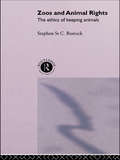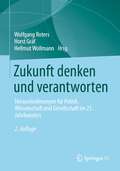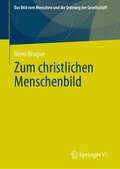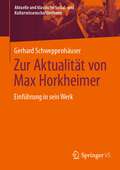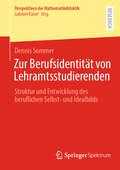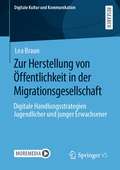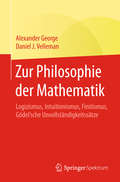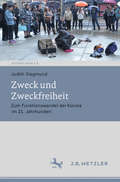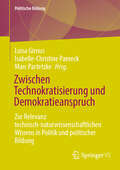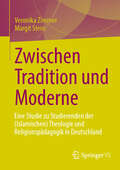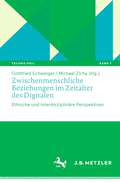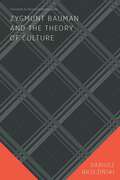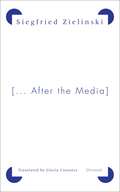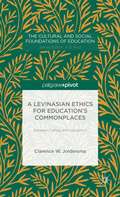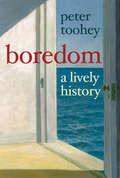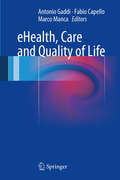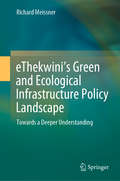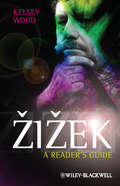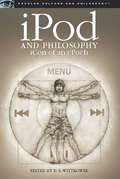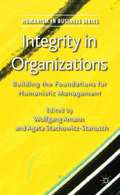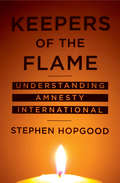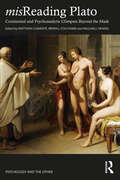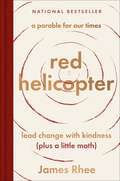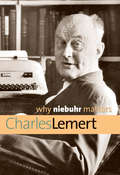- Table View
- List View
Zoos and Animal Rights: The Ethics Of Keeping Animals
by Stephen St BostockFirst Published in 2004. Routledge is an imprint of Taylor & Francis, an informa company.
Zukunft denken und verantworten: Herausforderungen für Politik, Wissenschaft und Gesellschaft im 21. Jahrhundert
by Hellmut Wollmann Wolfgang Roters Horst GräfDieses Buch untersucht in einem Querschnitt durch aktuelle und künftig zu erwartende Herausforderungen für Politik, Wissenschaft und Gesellschaft (Finanzen, Digitales, Kultur, Stadtentwicklung, Wohnen, Verkehr, Bildung, usw.), ob und unter welchen Bedingungen Staat und Politik in der Lage sind, Zukunft zu denken und – noch wichtiger – zu gestalten. Als Referenzraum und -zeit ziehen zahlreiche Autor*innen die Stadtentwicklungspolitik der 1980er und 1990er Jahre in Nordrhein-Westfalen, vor allem für die Agglomeration Ruhr, heran. In der „Zeitenwende“ wurde der Band vor allem in seiner welt- und europapolitischen Dimension aktualisiert und erweitert.
Zum christlichen Menschenbild (Das Bild vom Menschen und die Ordnung der Gesellschaft)
by Rémi BragueDieses Buch entfaltet das christliche Menschenbild in seinen Umrissen. Die Frage nach dem Menschen verdient es nämlich, wieder neu gestellt zu werden, weil heute der ‚Humanismus‘ von einem zerstörerischen ‚Antihumanismus‘ bedroht ist.Warum besitzt der Mensch eine Würde und mithin Rechte? Die Antwort auf diese Frage fällt sehr unterschiedlich aus. Entsprechend unbestimmt, verschwommen und vieldeutig bleibt das Lippenbekenntnis zu Menschenwürde und Menschenrechten. Wer also ist jenes Lebewesen, das wir ‚Mensch‘ nennen? Jeder Versuch einer wissenschaftlichen ‚Definition‘ führt theoretisch und praktisch zu unmenschlichen Folgen, wie zahllose Beispiele in der Geschichte des 20. Jahrhunderts auf erschreckende Weise zeigen. Das christliche Menschenbild verzichtet auf eine solche Definition und zeichnet jene Kontur eines Vorbildes, auf die hin der Mensch in Christus seine vollkommene, abgeschlossene Gestalt gefunden hat.Die anthropologischen, sozialen und politischen Folgen eines so geprägten Menschenbildes werden in diesem Buch erörtert: als Plädoyer für die Achtung der Natur des Menschen, die nicht der eigenen Verfügungsgewalt noch der Beherrschung durch Dritte in die Hand gelegt ist.
Zur Aktualität von Max Horkheimer: Einführung in sein Werk (Aktuelle und klassische Sozial- und KulturwissenschaftlerInnen)
by Gerhard SchweppenhäuserDas Buch führt umfassend und kenntnisreich in das Werk Max Horkheimers ein und leistet einen Beitrag zur Aktualisierung seiner theoretischen Ansätze.
Zur Berufsidentität von Lehramtsstudierenden: Struktur und Entwicklung des beruflichen Selbst- und Idealbilds (Perspektiven der Mathematikdidaktik)
by Dennis SommerDie vorliegende kumulative Dissertation thematisiert die Berufsidentität von Lehramtsstudierenden und Ergebnisse zu Zusammenhängen zwischen dem beruflichen Selbst- und Idealbild und dem studierten Lehramt, dem Studienabschnitt und den Unterrichtsfächern sowie der längsschnittlichen Entwicklung im Studienverlauf. Es wurden im Rahmen des BMBF-geförderten Projekts "Professionelles Lehrerhandeln zur Förderung fachlichen Lernens unter sich verändernden gesellschaftlichen Bedingungen" (ProfaLe) der Universität Hamburg der gemeinsamen Qualitätsoffensive Lehrerbildung im Zeitraum von 2016 bis 2023 mehrere Online-Erhebungen unter Lehramtsstudierenden durchgeführt. Die vorliegende Dissertation basiert auf drei Studien, die im Rahmen der Begleitforschung des Projekts ProfaLe durchgeführt wurden und die sich mit der Berufsidentität von Lehramtsstudierenden befassen. Insgesamt wird in den drei Studien der vorliegenden kumulativen Dissertation deutlich, dass das Selbstbild der Berufsidentität im Zusammenhang mit persönlichen und Kontextfaktoren steht und sich im Studienverlauf verändert und dass individuelle schulartspezifische Idealbilder der Berufsidentität einen weitestgehenden Konsens sowie eine sich mit fortschreitender Studiendauer einstellende Stabilität aufweisen. Eine verstärkte Thematisierung der Berufsidentität in der universitären Ausbildung, insbesondere am Studienbeginn, erscheint sehr wertvoll für die professionelle Entwicklung von Lehramtsstudierenden.
Zur Herstellung von Öffentlichkeit in der Migrationsgesellschaft: Digitale Handlungsstrategien Jugendlicher und junger Erwachsener (Digitale Kultur und Kommunikation #8)
by Lea BraunGegenstand dieses Bandes ist die Frage, wie Jugendliche und junge Erwachsene im digitalen Raum ihre eigene Rolle in der Migrationsgesellschaft bearbeiten. Dazu werden die Ergebnisse einer empirischen Forschungsarbeit vorgestellt, in der narrative Interviews mit jungen Medienproduzent*innen geführt wurden. Das Sample der Untersuchung umfasst sieben Fälle, in denen junge Menschen im Alter zwischen 16 und 25 Jahren digitale Öffentlichkeiten herstellen und damit transkulturelle Machtverhältnisse bearbeiten. Zudem etablieren sie neue ästhetische Darstellungsformen und treten als aktive Gestalter*innen von Medienkultur auf. Dabei liegt die methodische Besonderheit der Untersuchung in der Triangulation von dokumentarischer Bild- bzw. Videoanalyse mit der dokumentarischen Interpretation narrativer Interviews.
Zur Philosophie der Mathematik: Logizismus, Intuitionismus, Finitismus, Gödel'sche Unvollständigkeitssätze
by Alexander George Daniel J. VellemanDieses Buch bietet einen lebendig geschriebenen Überblick über die Philosophie der MathematikGibt eine gut motivierte und verständliche Einführung in die axiomatische Mengenlehre.<P><P> Zeigt in vorbildlicher Weise die Verzahnung von Mathematik und Philosophie der Mathematik.<P> Dieses Buch blickt in eine bedeutende Epoche der Philosophie der Mathematik zurück, deren Strömungen die heutige Gestalt der Mathematik prägten. <P> In der Wende vom 19. zum 20. Jahrhundert befand sich die Mathematik in einem fundamentalen Umbruch, der die Mathematiker dieser Zeit herausforderte. Sie mussten Stellung beziehen. Die Grundsätze und Wege der philosophischen Richtungen, die dieses Buch verständlich, kritisch und anerkennend beschreibt, wurden von Mathematikern formuliert. Eine Zeit gravierender Disharmonien begann, die bis in Streit und Feindschaften mündeten und zugleich faszinierende und fruchtbare Ergebnisse hervorbrachten, mathematisch wie philosophisch.<P> Es war ein aufregendes, intellektuelles Abenteuer zu Beginn des 20. Jahrhunderts auf einem außergewöhnlich scharfsinnigen und kreativen Niveau. Die Debatte über die unversöhnlichen Ansichten versiegte allmählich und inzwischen ist wieder relative Ruhe in die Gemeinde der Mathematiker eingekehrt. Zentrale philosophische Fragen aber, die damals die Protagonisten spalteten, sind nach wie vor unbeantwortet.<P> Die Suche nach dem Wesen der Mathematik geht weiter und greift auf die Ideen dieser Kontroversen zurück.<P>
Zweck und Zweckfreiheit: Zum Funktionswandel der Künste im 21. Jahrhundert (Ästhetiken X.0 – Zeitgenössische Konturen ästhetischen Denkens)
by Judith SiegmundIn der Theoriegeschichte der ästhetischen Theorie hat sich im 20. Jahrhundert eine Lesart der Kantischen Analytik des Schönen herausgebildet, welche die Zweckfreiheit der Künste als Dogma ihrer Funktionslosigkeit versteht. Dem gegenüber gibt es Entwicklungen auf dem Feld der Künste, die in eine andere Richtung weisen. Das Buchprojekt geht von der impliziten Annahme aus, dass ästhetische Theorie sich ihrem Gegenstand gegenüber als angemessen erweisen muss. Es besteht daher eine Notwendigkeit, die theoretischen Parameter der Zweckfreiheit, Autonomie und Funktionslosigkeit neu zu überdenken. Die Strategie dieser Operation besteht darin, sich mit der philosophischen Geschichte des Zweckbegriffs auseinanderzusetzen und diese in ein Verhältnis zu aktuellen Diskursen und Phänomenologien der Kunst zu setzen. Auf dem Prüfstand steht damit die Funktion/Funktionslosigkeit der Kunst in der Gesellschaft sowie eine Neufassung ihrer Zwecke.
Zwischen Technokratisierung und Demokratieanspruch: Zur Relevanz technisch-naturwissenschaftlichen Wissens in Politik und politischer Bildung (Politische Bildung)
by Marc Partetzke Isabelle-Christine Panreck Luisa GirnusDie Coronapandemie und aktuell die rasch fortschreitenden Innovationen im Bereich künstlicher Intelligenz verdicht(et)en den Blick auf technisch-naturwissenschaftliches Wissen und dessen Wirkkraft im politischen Diskurs. In den Mittelpunkt demokratietheoretischer Auseinandersetzungen rückt die Frage, welchen Einfluss wissenschaftliche Implikationen, insbesondere technisch-naturwissenschaftliche Evidenz, auf politische Entscheidungen haben sollten. Auch die Wirkung technologischer Fortschritt auf die Funktionsfähigkeit von Demokratien insgesamt verdient erneut Aufmerksamkeit. Die interdisziplinären Beträge dieses Bandes fragen hinsichtlich politischer Teilhabe und Bildung, wo Möglichkeiten und Grenzen einer kritischen Perspektive gegenüber entgrenztem Wissen und einer inkorporierten technologiegeprägten Wirklichkeit bestehen. Unvermeidlich scheint eine Erweiterung des datenbasierten Wissens (data, statistical bzw. digital literacy) und die Verbindung zur Informations- und Medienbildung. Gerade die hohe gesellschaftliche Relevanz bei vergleichsweiser dünner struktureller Verankerung in der (schulischen) politischen Bildung provoziert die Frage nach Schnittmengen von mathematisch-naturwissenschaftlicher und politischer Bildung. Wechselseitige Vorteile naturwissenschaftlicher und gesellschaftlicher Bildung scheinen mithin nur unzureichend ausgeschöpft.
Zwischen Tradition und Moderne: Eine Studie zu Studierenden der (Islamischen) Theologie und Religionspädagogik in Deutschland
by Veronika Zimmer Margit SteinDie qualitative Studie zielt darauf ab, die Motivation und Haltung angehender Religionslehrkräfte verschiedener Glaubensrichtungen zu untersuchen. Das Forschungsteam führte insgesamt 83 vertiefende Einzelinterviews durch (34 Studierende der Islamischen Theologie mit Lehramtsoption und 19 Studierende ohne Lehramtsoption sowie 30 Studierende der Katholischen Theologie mit Lehramtsoption). Die Ergebnisse geben Einblicke in die Herausforderungen und Chancen des Religionsunterrichts in einer pluralistischen Gesellschaft. Darüber hinaus könnten sie wertvolle Impulse für die Gestaltung einer integrativen Bildungspolitik bieten, die auf Respekt und interreligiöser Verständigung basiert.
Zwischenmenschliche Beziehungen im Zeitalter des Digitalen: Ethische und interdisziplinäre Perspektiven (Techno:Phil – Aktuelle Herausforderungen der Technikphilosophie #7)
by Gottfried Schweiger Michael ZichyDigitalisierung ist eine Schlüsseltechnologie im 21. Jahrhundert und prägt heute das private Leben und den Alltag durch Internet, Laptop, Smartphone, KI oder Soziale Medien. Das gilt insbesondere auch für zwischenmenschliche Beziehungen – zum Beispiel in Familie, Beruf, Freundschaft, Liebe, Therapie. Solche Beziehungen sind für Menschen von großer Bedeutung, sie sind wichtig für die psychische und physische Gesundheit, für Erfahrungen der Anerkennung und für ein gutes Leben – dahinter steht die anthropologische These des Menschen als animal sociale. Die Veränderung von Beziehungen – und zwar nicht nur ihrer Form, sondern auch ihres Inhalts und ihrer Wertigkeit – durch die Digitalisierung bedarf daher der eingehenden ethischen und interdisziplinären Reflexion. In diesem Band werden ausgewählte Beziehungsformen unter den Bedingungen der Digitalisierung aus unterschiedlichen disziplinären Perspektiven reflektiert, um Chancen, Potentiale, aber auch Risiken und Herausforderungen sichtbar zu machen.
Zygmunt Bauman and the Theory of Culture
by Dariusz BrzezińskiOne of the most influential intellectuals of the twentieth and twenty-first centuries, sociologist and philosopher Zygmunt Bauman (1925–2017) made reflection on culture a fundamental part of his academic work. He published a substantial number of papers on the topic, and many of his concepts would go on to significantly influence the social sciences and humanities. Bauman began his theoretical studies on culture when working at the University of Warsaw and continued them all his life. Inspired by the many intellectual currents he encountered over his more than six decades of work, Bauman wrote on culture in the contexts of such issues as Marxism and socialism, modernity and the Holocaust, postmodernity and liquid modernity, and contemporary nostalgia. In Zygmunt Bauman and the Theory of Culture Dariusz Brzeziński uses the evolution of Bauman’s theory of culture as a prism through which to offer a comparative analysis, putting Bauman’s work in conversation with the writings of other contemporary intellectuals.In this first comprehensive and critical assessment of Bauman’s lifelong work on culture, Brzeziński includes Bauman’s Polish-language papers and books, as well as his works discovered only posthumously, presenting them to an international audience.
[...After the Media]: News from the Slow-Fading Twentieth Century (Univocal)
by Siegfried ZielinskiThe media are now redundant. In an overview of developments spanning the past seventy years, Siegfried Zielinski&’s [ . . . After the Media] discusses how the means of technology-based communication assumed a systemic character and how theory, art, and criticism were operative in this process. Media-explicit thinking is contrasted with media-implicit thought. Points of contact with an arts perspective include a reinterpretation of the artist Nam June Paik and an introduction to the work of Jake and Dinos Chapman. The essay ends with two appeals. In an outline of a precise philology of exact things, Zielinski suggests possibilities of how things could proceed after the media. With a vade mecum against psychopathia medialis in the form of a manifesto, the book advocates for a distinction to be made between online existence and offline being.
a levinasian ethics for education’s commonplaces: between calling and inspiration
by Nick To JohnJoldersma applies Levinas's ethics systematically to the commonplaces of education - teaching, learning, curriculum, and institutions - and elucidates the role of justice and responsibility and the meaning of calling and inspiration in education.
boredom
by Peter TooheyIn the first book to argue for the benefits of boredom, Peter Toohey dispels the myth that it's simply a childish emotion or an existential malaise like Jean-Paul Sartre's nausea. He shows how boredom is, in fact, one of our most common and constructive emotions and is an essential part of the human experience. This informative and entertaining investigation of boredom--what it is and what it isn't, its uses and its dangers--spans more than 3,000 years of history and takes readers through fascinating neurological and psychological theories of emotion, as well as recent scientific investigations, to illustrate its role in our lives. There are Australian aboriginals and bored Romans, Jeffrey Archer and caged cockatoos, Camus and the early Christians, Dürer and Degas. Toohey also explores the important role that boredom plays in popular and highbrow culture and how over the centuries it has proven to be a stimulus for art and literature. Toohey shows that boredom is a universal emotion experienced by humans throughout history and he explains its place, and value, in today's world. Boredom: A Lively History is vital reading for anyone interested in what goes on when supposedly nothing happens.
eHealth, Care and Quality of Life
by Fabio Capello Antonio Gaddi Marco MancaThe debate over eHealth is alive as never before. Supporters suggest that it will result in dramatic innovations in healthcare, including a giant leap towards patient-centered care, new opportunities to improve effectiveness, and enhanced wellness and quality of life. In addition, the growing market value of investments in health IT suggests that eHealth can offer at least a partial cure for the current economic stagnation. Detractors counter these arguments by claiming that eHealth has already failed: the UK Department of Health has shut down the NHS National Program for IT, Google has discontinued its Health flagship, and doubts have arisen over privacy safeguards for both patients and medical professionals. This book briefly explains why caregivers, professionals, technicians, patients, politicians, and others should all consider themselves stakeholders in eHealth. It offers myth-busting responses to some ill-considered arguments from both sides of the trench, in the process allowing a fresh look at eHealth. In addition, it describes how the technical failures of previous eHealth systems can be avoided, examines the legal basis of eHealth, and discusses associated ethical issues.
eThekwini’s Green and Ecological Infrastructure Policy Landscape: Towards a Deeper Understanding
by Richard MeissnerThis book offers the reader a deeper understanding of the eThekwini Metropolitan Municipality’s green and ecological infrastructure policy landscape. The author utilises the PULSE3 analytical framework to conduct an in-depth examination and to show how experts frame and implement the municipality’s green and ecological infrastructure strategies and projects. Although the initial purpose of this book was to investigate the role of green and ecological infrastructures in eThekwini’s water security aspirations, the author realised that climate change adaptation and mitigation play a more central role in motivating the municipality to develop and implement such science-driven projects. To be sure, science that is informed by a positivist paradigm, guides how, where and when the municipality should develop green and ecological infrastructures. Furthermore, a positivistic stance is generated in this policy landscape, where science and politics meet at a local government level, and the book offers an insight into the science–policy interface, as well as the normative and value orientations that positivism often ignores. The book also shows the usefulness of the PULSE3 framework and how it can assist scientists in all fields to gain a deeper understanding of the complications that are faced by humankind. This book fills a market gap by providing a view of how scientists think about problems and how to solve them by using established paradigms and theories.
i ek A Reader's Guide
by Kelsey WoodA comprehensive overview of Slavoj ?i?ek's thought, including all of his published works to date. Provides a solid basis in the work of an engaging thinker and teacher whose ideas will continue to inform philosophical, psychological, political, and cultural discourses well into the future Identifies the major currents in ?i?ek's thought, discussing all of his works and providing a background in continental philosophy and psychoanalytic theory necessary to its understanding Explores ?i?ek's growing popularity through his engagement in current events, politics, and cultural studies Pertains to a variety of fields, including contemporary philosophy, psychology, cultural studies, sociology, political science, esthetics, literary theory, film theory, and theology
iPod and Philosophy
by D. E. WittkowerThe iPod is transforming the lives of millions, changing their relationship to music and to each other. In iPod and Philosophy, 18 philosophers with diverse specialties and points of view bring their expertise to bear on this international cultural phenomenon. They explore such questions as how individuals become defined by their iPods, what the shuffle feature says about the role of randomness in people's lives, and much more.
integrity in organizations
by Wolfgang Amann Agata Stachowicz-StanuschGoes beyond the call for more humanistic management in the aftermath of a series of corporate scandals and the recent financial crisis, and offers advice on how we can build more humanistic organizations with the help of integrity. The authors shed light on leadership, governance and further implementation issues.
keepers OF THE flame
by Stephen Hopgood"If one organization is synonymous with keeping hope alive, even as a faint glimmer in the darkness of a prison, it is Amnesty International. Amnesty has been the light, and that light was truth-bearing witness to suffering hidden from the eyes of the world. "-from Keepers of the Flame The first in-depth look at working life inside a major human rights organization, Keepers of the Flame charts the history of Amnesty International and the development of its nerve center, the International Secretariat, over forty-five years. Through interviews with staff members, archival research, and unprecedented access to Amnesty International's internal meetings, Stephen Hopgood provides an engrossing and enlightening account of day-to-day operations within the organization, larger decisions about the nature of its mission, and struggles over the implementation of that mission. An enduring feature of Amnesty's inner life, Hopgood finds, has been a recurrent struggle between the "keepers of the flame" who seek to preserve Amnesty's accumulated store of moral authority and reformers who hope to change, modernize, and use that moral authority in ways that its protectors fear may erode the organization's uniqueness. He also explores how this concept of moral authority affects the working lives of the servants of such an ideal and the ways in which it can undermine an institution's political authority over time. Hopgood argues that human-rights activism is a social practice best understood as a secular religion where internal conflict between sacred and profane-the mission and the practicalities of everyday operations-are both unavoidable and necessary. Keepers of the Flame is vital reading for anyone interested in Amnesty International, its accomplishments, agonies, obligations, fears, opportunities, and challenges-or, more broadly, in how humanitarian organizations accommodate the moral passions that energize volunteers and professional staff alike.
misReading Plato: Continental and Psychoanalytic Glimpses Beyond the Mask (Psychology and the Other)
by Matthew Clemente Bryan J. Cocchiara William J. HendelThis book reorients the scholarship on Plato by returning readers to his most fundamental insights and reflections on the nature of the human psyche and the human condition. By approaching the dialogue anew, as if for the first time, the book creates new intellectual pathways by opening the conversation to a clash of ideas. The contributors offer nuanced, nontraditional readings of Plato, readings that not only analyze but also build on the dialogues by bringing them into conversation with psychoanalysis, phenomenology, and contemporary continental thought more broadly. It addresses a major gap in the literature caused by reading Plato as a metaphysician or moral or political philosopher and not, primarily, as a psychologist. Psychologists and scholars in philosophy, psychoanalysis, Platonic thought, and other humanities-related disciplines will find this new approach to Plato refreshing, accessible, and uniquely innovative.
red helicopter—a parable for our times: lead change with kindness (plus a little math)
by James RheeA NATIONAL BESTSELLEREmbrace your agency, lead change, and fly free—in the business of life and the life of business—with kindness (plus a little math)In kindergarten, James Rhee received a toy red helicopter in gratitude for a simple act of generosity—sharing his lunch. Decades later, the lesson from that small gift led him to develop a human-centered framework for business and personal achievement that helped him overcome seemingly insurmountable hurdles and find unprecedented success.“red helicopter is a transformative experience. James Rhee's story is a must read for anyone, of any age, who wishes to think, act, and lead with balance, agility, and wisdom." —Jay ShettyRhee was a high school teacher turned private equity investor when he unexpectedly took the helm of Ashley Stewart, an iconic company predominantly employing and serving Black women. Inspired by the values his dying Korean immigrant parents instilled in him, he knew that a radically different—yet familiar—approach was required to lead this twice-bankrupt company from certain liquidation to true transcendence.Is it possible to be successful and kind? To lead with precision and compassion? To honor who we are in all areas of our lives?The entire world bet against him and Ashley, but Rhee trusted his instincts to identify, measure, and leverage the intangible goodwill at the company’s core, a decision which ultimately multiplied its fortunes several times over.Anyone can combine the clarity and imagination we had as children with fundamental business metrics. Anyone can apply this refreshingly intuitive approach to lead change at work and at home. While eloquently sharing a story of personal and professional success, red helicopter presents a comforting yet bold solution to the dissatisfaction and worry we all feel in a chaotic and sometimes terrifying world.The insights and knowledge that Rhee imparts have been accumulated over decades of investing and leading at the highest levels of business. Drawing on this experience, he encourages us to trust the wisdom deep inside each of us so we can learn how to:Create and measure “goodwill,” the ultimate collective goodDiscover agency and the truth about kindness it entailsIdentify the invisible obstacles standing in your wayLead transformational change through small, scalable actsConstruct an accurate “balance sheet” of our assets and liabilitiesReorient our lives, organizations, and the world to reflect the best in usAre you looking for a sustainable balance between life, money, and joy? For yourself and others?Imagine, a clear path forward told as a deeply felt human story. A poignant and uplifting celebration of humanity, red helicopter—a parable for our times is a tale of struggle and triumph, compelling for its honesty and relatability as much as for the instructions we can all use to balance the books of our lives.red helicopter—a parable for our times features approximately 20 original illustrations by Korean artist Heyon Cho.
why niebuhr matters
by Charles LemertReinhold Niebuhr (1892-1971) was a Protestant preacher, an influential religious thinker, and an important moral guide in mid-twentieth-century America. But what does he have to say to us now? In what way does he inform the thinking of political leaders and commentators from Barack Obama and Madeleine Albright to David Brooks and Walter Russell Mead, all of whom acknowledge his influence? In this lively overview of Niebuhr's career, Charles Lemert analyzes why interest in Niebuhr is rising and how Niebuhr provides the answers we ache for in the face of seismic shifts in the global order. In the middle of the twentieth century, having outgrown a theological liberalism, Niebuhr challenged and rethought the nonsocialist Left in American politics. He developed a political realism that refused to sacrifice ideals to mere pragmatism, or politics to bitterness and greed. He examined the problem of morality in an immoral society and reimagined the balance between rights and freedom for the individual and social justice for the many. With brevity and deep insight, Lemert shows how Niebuhr's ideas illuminate our most difficult questions today.
Fragmente eines Willens zum Wissen: Michel Foucaults Vorlesungen 1970 - 1984 (Philosophie & Kritik. Neue Beiträge zur politischen Philosophie und Kritischen Theorie)
by Frieder VogelmannVon den Theorien und Institutionen des Strafens über die psychiatrische Macht bis zum modernen Staatsrassismus und der (neo)liberalen Gouvernementalität, von den Selbstbildungspraktiken der griechischen Antike über die Notwendigkeit des freimütigen Sprechens in der Demokratie bis zur kynischen Wahrheit einer anderen Welt reichen die Themen in Michel Foucaults Vorlesungen, die er am Collège de France von 1970 bis 1984 gehalten hat. Und quer durch alle hindurch ziehen sich die Fragen nach dem Zusammenhang von Wissen, Macht und Subjektivität sowie nach der Methode, um diese erhellen zu können. Dieser Band nimmt die vollständige Veröffentlichung der 13 Vorlesungen zum Anlass, sie sowohl als Ganzes als auch jede einzelne Vorlesung zu betrachten. Damit bietet er tiefe Einblicke in Foucaults Vorlesungen und liefert zugleich eine umfassende Einführung in diesen Teil von Foucaults Werk.
